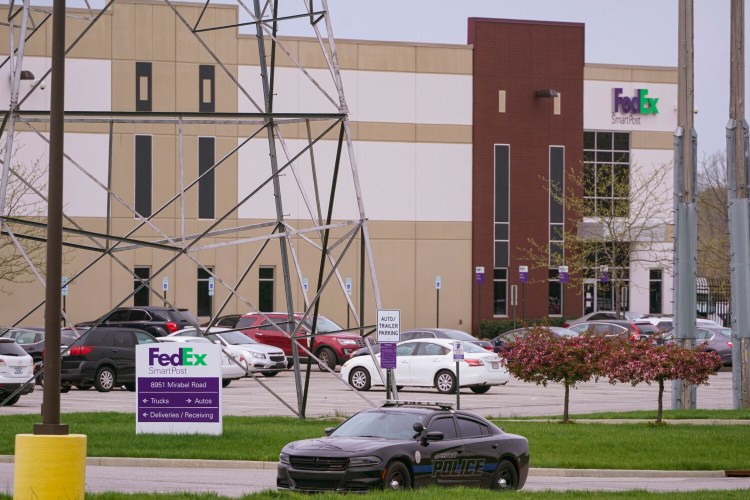INDIANAPOLIS — A former employee who shot and killed eight people at a FedEx facility in Indianapolis never appeared before a judge for a hearing under Indiana’s “red flag” law, even after his mother called police last year to say her son might commit “suicide by cop,” a prosecutor said Monday.
Marion County Prosecutor Ryan Mears said authorities did not seek such a hearing because they did not have enough time under the law’s restrictions to definitively demonstrate Brandon Scott Hole’s propensity for suicidal thoughts, something they would need to have done to convince a judge that Hole should not be allowed to possess a gun.
The “red flag” legislation, passed in Indiana in 2005 and also in effect in other states, allows police or courts to seize guns from people who show warning signs of violence. Police seized a pump-action shotgun from Hole, then 18, in March 2020 after they received the call from his mother.
But prosecutors were limited in their ability to prepare a “red flag” case due to a 2019 change in the law that requires courts to make a “good-faith effort” to hold a hearing within 14 days. An additional amendment required them to file an affidavit with the court within 48 hours.
“This individual was taken and treated by medical professionals and he was cut loose,” and was not even prescribed any medication, Mears said. “The risk is, if we move forward with that (red flag) process and lose, we have to give that firearm back to that person. That’s not something we were willing to do.”
Indianapolis police previously said that they never did return the shotgun to Hole. Authorities have said he used two “assault-style” rifles to gun down eight people at the FedEx facility last Thursday before he killed himself.
Police on Monday identified the high-capacity weapons used by Hole, who was 19 at the time of the shooting. One was a Ruger AR-556 Hole purchased in September. The second was an HM Defense HM15F he bought in July, just months after police had seized the pump-action shotgun. A Ruger AR-556 also was used last month in a shooting that killed 10 people in Boulder, Colorado.
Alcohol, Tobacco and Firearms determined that the guns were purchased legally through authorized dealers, according to a police news release that did not name the dealers. The release also said FedEx terminated Hole in October when he failed to return to work.
Other amendments to the law in 2019 made it a misdemeanor for a person deemed dangerous to buy or possess a gun and a felony offense for anyone to give or sell a gun to a dangerous person.
Republican state Sen. Erin Houchin, a sponsor of those tougher provisions, said in the Hole case the law “could have worked just as it should, but the prosecutor never pursued it.”
But Mears said there are still problems that need to be addressed.
“There are a number of loopholes in the practical application of this law. … It does not necessarily give everyone the tools they need to make the most well-informed decisions,” he said.
Mears said he had already spoken to legislators in the past about lengthening the two-week timeline for holding a red flag hearing and he reiterated that call on Monday. Extending the time frame would give prosecutors more time to investigate a person’s background and mental health history before going in front of a judge, he said. He added that he would also like to see the statute prohibit a person under investigation from buying a gun until the hearing is held and the judge makes a final ruling.
Mears said the red flag law is “a good start, but it’s far from perfect.”
“I think people hear ‘red flag’ and they think it’s the panacea to all these issues. It’s not,” he said.
Mears said the prosecutor’s office has filed eight red flag petitions this year. All are still awaiting rulings from a judge.
Democratic state Rep. Ed DeLaney, a gun control advocate, said he hoped Republicans would be receptive to reviewing the law in the future. He said there isn’t time to force an immediate debate because the 2021 legislative session is slated to end later this week.
“What we’re trying to do is write a very complicated law to deal with a small percentage of those people who have those weapons who surface,” he said. “This is a very tight path we’ve set out to deal with those people, and obviously it’s not adequate.”
Paul Helmke, an Indiana University civics professor and former president of the Brady Center to Prevent Gun Violence, said Indiana’s law could be strengthened with mandated court hearings or language prohibiting a person from acquiring additional firearms until a judge issues an order about that person’s competency.
In Hole’s case, that would have meant that his family’s agreement to not ask for the seized gun back would not have been enough to avoid a court hearing, and could have prevented him from purchasing additional weapons, said Helmke, a former Republican mayor of Fort Wayne, Indiana.
“Indiana should be doing more to address these loopholes,” Helmke said. “This shooter, basically, he played the system. There was never a court finding that he was a danger to himself or others, and that meant he was free to buy as many guns as he wanted afterward.”
Indiana was one of the first states to enact a red flag law, after an Indianapolis police officer was killed in 2004 by a man whose weapons were returned to him despite his hospitalization months earlier for an emergency mental health evaluation.
Indianapolis police recovered 191 guns last year under the red flag law, police said Monday in a release that did not say how many people that involved or the types of weapons.
Copy the Story LinkComments are not available on this story.
Send questions/comments to the editors.


